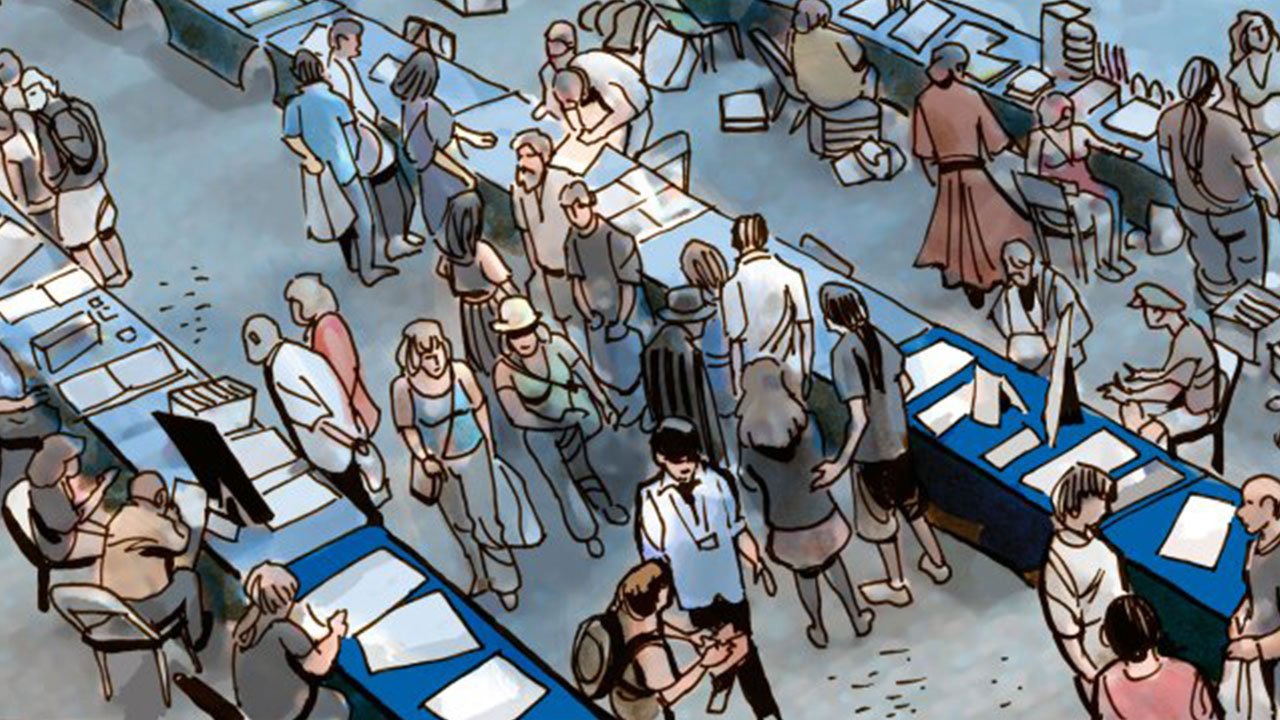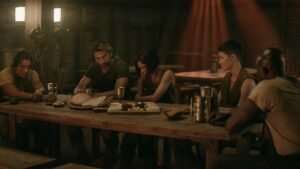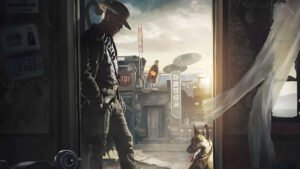In 2008, artist Mark Wheatley and co-scripter Robert Tinnell joined forces to create the Harvey Award-nominated online comic, EZ Street.
Chronicling two brothers, Scott and Danny Fletcher, EZ Street is an introspective tale about the tragedies and successes that plague the pursuit of creative freedoms. Feeling stifled by their respective employment situations, this complex comic explores the bonds of family, passions of art, and the limitations of career. Since then, the two have collaborated on the quasi-follow up Lone Justice, and are currently churning out a highly-anticipated Lone Justice sequel. Just before the New Year, Mark Wheatley took some time away from his Insight Studios to discuss the creative nuances behind EZ Street.
CGMagazine: On the surface, the graphic novel EZ Street is a comic about the making of another comic. However, it is more complex than that. How fair would it be to say EZ Street was a direct by-product of your age and experience?
Mark Wheatley: Well, everything I have ever created is a direct by-product of wherever I am at that moment. So in that sense, being an artist is a matter of taking advantage of whatever opportunities are available. Also, you are always trying to sell whatever other people are buying.
CGMagazine: And at the time, what were people buying?
Mark Wheatley: In this case, Comicmix.com was just being formed, and they wanted me to do a graphic novel for them. Surprisingly, their first approach was that I could do anything I wanted. So when I started submitting my ideas, which all tend to devolve into pulpy science fiction and two-fisted fantasy things, the editor Mike Gold specifically asked for one of my “weird ideas”, which he knew I had plenty. But I had gotten out of the habit of pitching them because no one would take them.
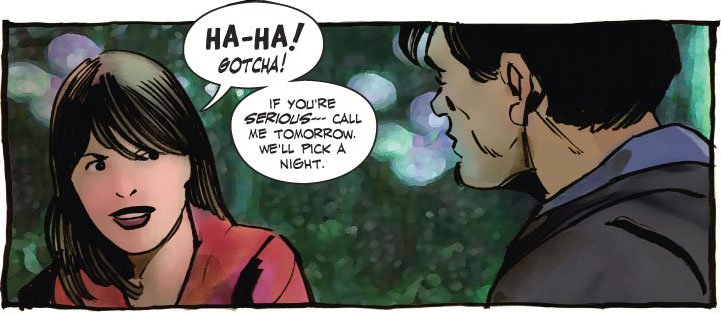
CGMagazine: So what did you do?
Mark Wheatley: Well, I immediately came back with EZ Street, because it had been something on my mind for several years. And what had caused me to think of it was that looking around our field, as comics were getting picked up by all sorts of other media like bookstores, movie theatres, and television screens. But yet as an industry, we were traditionally still showing a certain amount of embarrassment about working in comics. So I had wanted to create the equivalent of what the motion pictures had done, where they would be self-referential and do stories about Hollywood and people trying to get in and become a star.
CGMagazine: Speaking of becoming a star, EZ Street was nominated for the prestigious Harvey Award for Best Online Comic in 2008.
Mark Wheatley: We did that by the way with no bribes at all.
CGMagazine: Ooh. Was that with just monetary bribes, or were there other kinds of “favours”?
Mark Wheatley: Well, I was willing to do anything [laughter].
CGMagazine: I don’t blame you. It is a very prestigious award. Let’s talk about the ripple effect of these sorts of accolades though. If the idea for EZ Street had been bumping around for a while, then did the wave of critical success change the way you tackled future projects? Or has it simply reaffirmed the confidence in your creative instincts?
Mark Wheatley: I don’t know whether I have ever required confidence to be creative. It’s a compulsion, and I do it no matter what. But the people who publish my work have expressed a growing confidence in my ideas… When we went to the next project though, our editor Mike Gold was pretty much cool with whatever it was we wanted to do. In fact, he did not even read the ending of our next comic, Lone Justice until it was uploaded to the server.
CGMagazine: Interesting. That sounds like a surprising vote of confidence.
Mark Wheatley: Right. It is very freeing as a creator. In fact, one of the wonderful things about doing this online, as opposed to a print comic, is that it’s allowed us to be creative right up to the very end. We didn’t have to stick to tight page counts. We’ve been able to incorporate inspirations along the way, when it hits. I think that is just an absolutely wonderful way to create. In effect, it is as if we have been given a huge advance to write a novel, and get it exactly the way we want, it before we deliver it to the publisher.
CGMagazine: Speaking of the freedoms and limitations of professional writing, perhaps the most relatable line from EZ Street came from issue one. It was where the narrator speaks to his childhood self about the “dirty little secret” of breaking into the business – “That it never loves you back.” With that in mind, how has the critical success of EZ Street affected your subsequent projects?
Mark Wheatley: I still don’t feel any love [laughter].
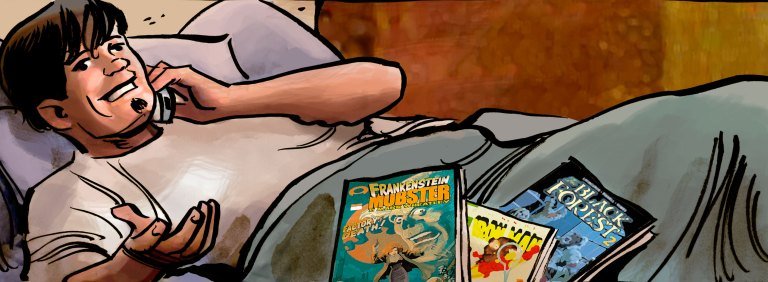
CGMagazine: You mean you’ve seen it, but you just don’t feel it?
Mark Wheatley: It’s not true to say that I don’t feel any love. But I think it is true in the way we represent love in the book. We state it several times that it is the Industry that doesn’t love you back. The comic industry is a marketing and merchandising system. If I am making money, then they love me. If I am not making money, then they don’t. They may respect me, they may admire me, but unless I am making money, they are incapable of love.
CGMagazine: To shift gears slightly, you have referred to your recent comic series Lone Justice as “a sideways sequel to EZ Street”. Can you elaborate on the connection between this introspective graphic novel EZ Street and the superhero pulp comic Lone Justice?
Mark Wheatley: Well there are a couple of levels to that. We knew going into EZ Street that our two protagonists, Scott and Danny, were going to end up creating a graphic novel. The question going into it was, “Which one would they create?” We kind of thought it would be Lone Justice, but every time Bob and I introduced another idea into the series, we would become enamoured with it.
CGMagazine: So the excitement of Scott and Danny mirrored the excitement of you and Bob?
Mark Wheatley: Right. But in the way the story turns out, they end up going on to create Lone Justice, which is why it’s a sort of sequel.
CGMagazine: Set during the Great Depression, Lone Justice was clearly a period piece. On the other hand, EZ Street spanned multiple decades. With that in mind, were Scott and Danny products of the 1980s and 1990s? Were their decisions to place steady careers above their passions for comics symbolic of that era? In other words, would it be fair to say that EZ Street is, in essence, its own type of period piece?
Mark Wheatley: Yeah, I think it is. I think there’s a universality that spreads over a wider period of time. Because EZ Street talks to people’s basic desires to either be a star, or to be creative and express something of personal. But the actual story we tell is rooted in a very definite period of time, because Bob and I pulled from our own experiences to lend it a sense of truth.
CGMagazine: Now you’ve discussed EZ Street’s genesis, and how much of your own experiences shaped Scott and Danny, but what about the supplementary characters? Are they a pastiche of other friends, lovers, and artists? Or are they just another reflection of Bob and yourself?
Mark Wheatley: Officially, any resemblance of peoples living or dead…
CGMagazine: Are conveniently coincidental?
Mark Wheatley: Yes [laughter]. I have run, and still do, a studio called Insight Studios. This has been going since the late 1970s. And an awful lot of writers, assistants, and wannabes have come through these doors and worked with me over the years. And I have seen guys come in and labour, and just be the most talented people you’ve ever seen in your life. And they just bang their heads against the wall for decades until they go off and work at a shoe store, or something.
CGMagazine: Gross. But the Fletcher brothers do go through their own kind of “shoe stores”, don’t they? What with Scott’s soulless film production, or Danny’s boring product design, right?
Mark Wheatley: Yeah. Then I’ll have another guy who comes in with just a basic talent, but who’s got a lot of moxy, and ability to get out there and sell himself. Then the next thing you know, he’s the biggest thing going. So, there is a lot of mixed elements that go into making yourself successful, and making opportunities arise for you. By the way, one of the biggest elements is that opportunity does exist.
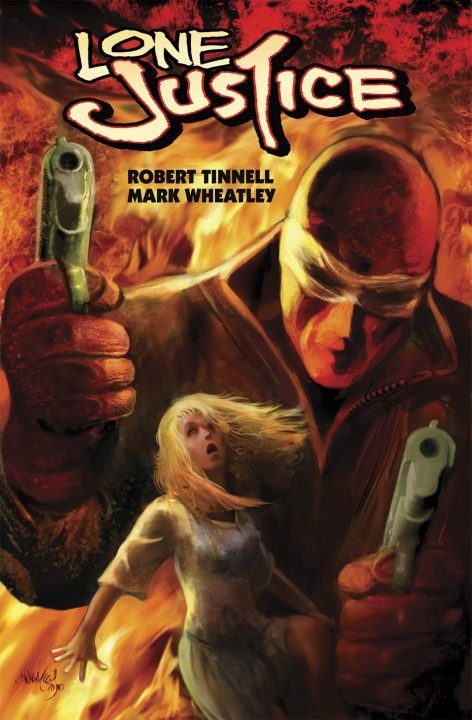
CGMagazine: That’s oddly comforting, isn’t it?
Mark Wheatley: Sure. A lot of folks have shown up at our doors and worked with us and struggled, but have never been able to sell a thing, simply because they showed up in the mid-90s when the industry was collapsing around their ears, and there were no opportunities.
CGMagazine: So, is opportunity based on chance?
Mark Wheatley: Absolutely. And I think the only thing you can do as a creator is to make sure you have got your kung fu to a really high level so that you can take advantage of any opportunities that arise for you.
CGMagazine: There’s an interesting segue. In the book, the two Fletcher brothers, Scott and Danny, come together to work on a comic book after successful but unsatisfying careers. In what ways did their experiences in other mediums reflect your own personal experiences? In particular, how did your own “kung fu” help to counter the great comic drought of the mid 1990s?
Mark Wheatley: Well, I am fairly multitalented, and so is Bob for that matter. We seemed to be able to move in whatever direction we decided to go. In the mid 90s, I didn’t so much run into problems selling my comics, but I ran into frustrations selling my comics because they kept ripping my ideas to shreds. So that even though I was getting published and making a living, the process was less pleasant than it should have been [laughter].
CGMagazine: So how did that unpleasantness affect your move into writing for television?
Mark Wheatley: Well, when the opportunity arose for me in television, I jumped at it. What I found fascinating was that after working in television for a little over a year, I got a phone call asking me to do some comics again.
CGMagazine: In your time as a television writer, did you ever feel as if you had “sold out”? Or do you view that time as a necessary stepping stone into a lasting career in comics?
Mark Wheatley: It was very exciting because it was something different. I had to study film script form, and I had to actually, um, write better [laughter]. For all I heard about television being sort of a meat grinder, and a very unpleasant place to work, I must say that the quality of people I was working with on the animated show was very high. It just about blew everything I knew in comics out of the water. In fact, one of the things that they forced me to do was stop writing on, you know, instinct.
CGMagazine: You mean writing less like Danny Fletcher, and more like Scott?
Mark Wheatley: Yeah. I learned to absolutely nail what I was doing. I had not really honed my understanding of dramatic structure, of building characters, creating motivations, and just understanding what a story arc was – and for that matter, being able to verbally pitch a story so that other people could tune into it.
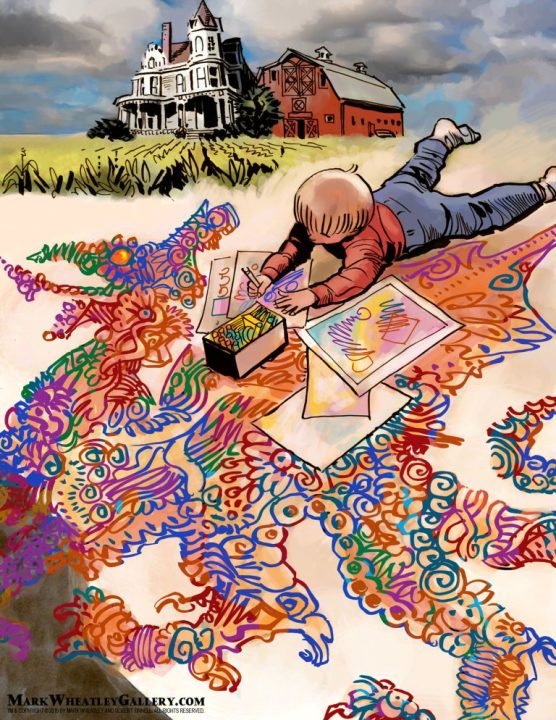
CGMagazine: That’s interesting considering how Scott comes back from Hollywood and talks about the formulaic nature of those Syd Fields screenwriting books, and how people adhere to them with an almost biblical reverence.
Mark Wheatley: Right. Exactly. You got it. And you know, that was really an ongoing conversation that Bob and I would have, because I don’t worship Syd Fields [laughter]. But with Bob, this is like second nature to him. And that is really wonderful. It is one of the reasons that I enjoy working with Bob. I mean, I can come up with a fairly inspired idea, but it is still unformed. You know, I have got a bunch of elements, and maybe a character or two. Then I’ll pitch them at Bob, and in the course of the conversation, Bob will turn it around and pitch it back to me. Only his will have a story arc, character motivations, and everything laid into place.
CGMagazine: So it was a successful collaboration. But in order to put it back into the context of EZ Street, how do you feel about the process of “riffing”, especially the kind that eventually occurred between Scott and Danny?
Mark Wheatley: Riffing is just the most fun ever. I always equate it to what you used to do in the sandbox, when a bunch of folks would have their Matchbox Cars or G.I. Joes, or whatever, and you were making up stories and playing together. You know?
CGMagazine: Yeah. And did that reflect the youthful spirit shown of the childhood brothers in EZ Street issue one?
Mark Wheatley: Yeah, and that was fun. You just made it up. There was no end result other than you were doing what was fun and creating fantasies that appealed to you at the time. So riffing is a lot like that. It’s like being an adult, only you are getting paid to play.
CGMagazine: That is again an interesting segue into the opening scenes of EZ Street where a cynical narrator is looking back upon Scott and Danny’s childhood passion for art and comics. It was particularly poignant the way the imagery subtly foreshadowed later revelations without any explicit dialogue. How difficult was it to strike that type of balance?
Mark Wheatley: That’s interesting. Bob and I bandied around ideas for the opening of EZ Street for a couple of months. And our original opening just sort of sat there like a lead weight for a long time. I was completely unsatisfied with it. Bob thought it was okay, but he wasn’t thrilled… Then one day Bob called me up and said “I got it. I don’t know where it came from, but I got it.” Then I looked on my e-mail and there it was verbatim. It was just inspired.
CGMagazine: That is interesting. You know, I may have been reading too much into this, but there was panel where we watch Danny drawing on the floor, which eventually resurfaced in one of Scott and Danny’s adult collaborations. That seemed to mirror that comic-within-a-comic theme of EZ Street. Was that intentional foreshadowing?
Mark Wheatley: Yeah, but that came much later though.
CGMagazine: So, on that note, there is a long history of authors using that story-within-a-story technique to add layers to a narrative. I mean, Hamlet has it with The Mousetrap, and more recently Inglourious Basterds has it with Nation’s Pride. Were you and Bob trying to say anything special with all the various comic ideas that Scott and Danny created?
Mark Wheatley: I think when we originally started with the concept, Bob and I both thought were could cavalierly throw in a bunch of our own junked and old ideas. But when we got into writing, we just got so turned on, creating stuff left and right, and our main question was “Which one of our new ideas do we want to throw in here?” We tried to do things that were reflective of the periods in which these guys were supposedly creating.
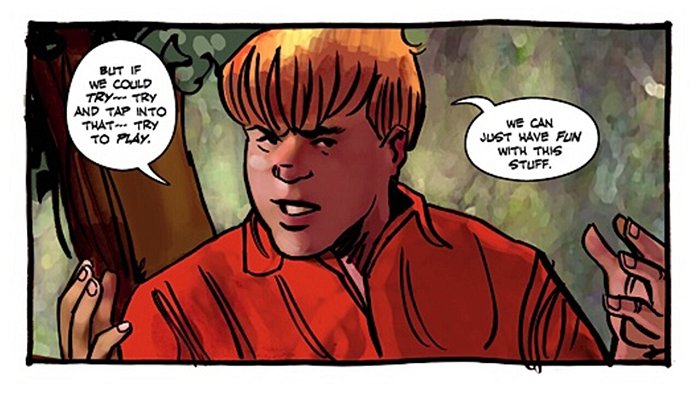
CGMagazine: Now, to sort of wind things down with EZ Street, it’s widely acknowledged that authors are their own worst critics. Even after successful productions, writers often look back on their creations with an uneasy sense of shame. So, considering the introspective nature of EZ Street, is there anything that you wish you could go back and advise yourself about?
Mark Wheatley: First of all, I think that is a very insightful question. You show a great understanding of writers and authors.
CGMagazine: I’m sorry, you’ll have to speak a little louder. My bosses are here, and I don’t think they heard you.
Mark Wheatley: [Laughter] The fact is that although I feel the emotions you’re describing, I try not to go back and rip old work to shreds.
CGMagazine: Like the way those old editors use to do to you?
Mark Wheatley: Yeah. I always just try to move onto the next project. It is always a deadline medium. You always need a certain amount of pages up every week, and we never have [laughter]. So there are weeks that I feel if I had an extra day or two to spend on the words or the art, then maybe it would have been a little better. But invariably, from working with other artists over the years, the things that they are most concerned about are generally not the things that readers of the book find weak or needed more work. So I tend to leave things the way they are.
CGMagazine: Well, how about the reverse? What would you like to retrospectively pat yourself on the back for?
Mark Wheatley: I am most proud of being able to pick really good people to work with, like Mike Gold and Robert Tinnell. I could pat myself on the back for that all day long because that is the gift that just keeps on giving.
CGMagazine: Lastly, I think that most avid comic readers are often stymied comic writers struggling to break out, or to even complete something. What sort of advice might the Fletcher brothers give to such struggling comic fans?
Mark Wheatley: I think they would say, “Just go for it”. If you have the dream and the inspiration, then you should just pursue it. My advice to artists who’ve come by Insight Studios over the years has always been that you will have the most success in life pursuing the things you love.
CGMagazine: And not just love you back?
CM: Mark Wheatley: If you create for validation or love outside of yourself you are just setting yourself up for a dead-end at some point in your life. The rewards from society are only the extras, not the reason to create. At least, that s how it is for me, and most of the happiest artists and writers I’ve known.
